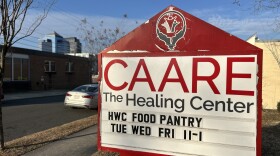One of the longest running Black film festivals in the nation opens Monday in Durham.
"The Hayti Heritage Film Festival" is in its 28th year and is being held in-person and online. It runs through Saturday, March 11.
Festival directors Lana Garland and Tyra Dixon joined WUNC recently to share some highlights.
This is an excerpt of an edited transcript of that conversation. You can hear the full interview by clicking the LISTEN button at the top of this post.
What does this year's theme "We Carry Them With Us" mean to you?
Dixon: "For me, it means honoring our legacy and bringing our ancestors with us."
Garland: "The focus of this festival is basically the development of a Black Southern film ecosystem. And so, in order to do that, we have to honor what has come before us, and then realize that we aren't the almost ancestors. And so, we're paving a way for the next generation to be able to come in and to tell this story. There are so many stories in the African American world around what happened to the people after the great migration. So, we hear about the Harlem Renaissance, we hear about what happened in Chicago and Los Angeles, but we never hear about the people who stayed down South."
Monday's opening night screening and reception includes the film "The Inspection" which follows a young, gay Black man struggling with his relationship with his mom while enlisted in the U.S. Marines. The silence can be uncomfortable for the viewer.
Garland: "I feel like I have seen those characters. before. I have seen young people who are living on the edge; he had all of his belongings in a in a trash bag. What it says to me is there's a level of authenticity in this film that really is captivating."
Dixon: "This story pulls audiences in. And so, that particular scene just really drives home the point of his story and focus his story just like him."
The documentary "Hazing" highlights a variety of underground hazing rituals that are abusive and sometimes deadly. A mother who lost her son during a hazing ritual will be attending. Does the film indicate how widespread some of these practices are and what are some examples?
Garland: "It's very harrowing, Pamela Champion will be in attendance to talk about her son, Robert Champion. I didn't even know until her son died, that there was such a thing as a marching band fraternity. I love the whole HBCU tradition of marching bands. I absolutely adore it. And so, the idea and notion that people could be hazed while a part of these amazing groups of musicians, I just could not understand it."
Another documentary, "God Said Give 'Em Drum Machines," traces the origins of techno and electronic music to Black artists in Detroit in the late 1970s and early 80s. Do you think today's electronic music fans know this origin story?
Garland: "I don't think so. Not at all. You know, when you talk about techno, I associate that mainly with Europe at this point. At some point, there was a changing of the guards with regard to the words. And so, it seemed like once white people fell in love with techno, then kind of — we started calling it house, and house kind of went on its own trajectory. But when it comes to Black folks and techno? No. But then this film came out... Once I saw it, I got it. And so, it's just another one of those sad occurrences for marginalized groups that when we have a particular art form, and we hold it, and then it becomes mainstream to a particular degree, and we feel like we've lost the connection with it.
Lana Garland and Tyra Dixon are co-directors of the 28th Annual Hayti Heritage Film Festival. It opens Monday in Durham and runs through the end of the week. It takes place at the Hayti Heritage Cultural Center and online. Tickets are available now.







